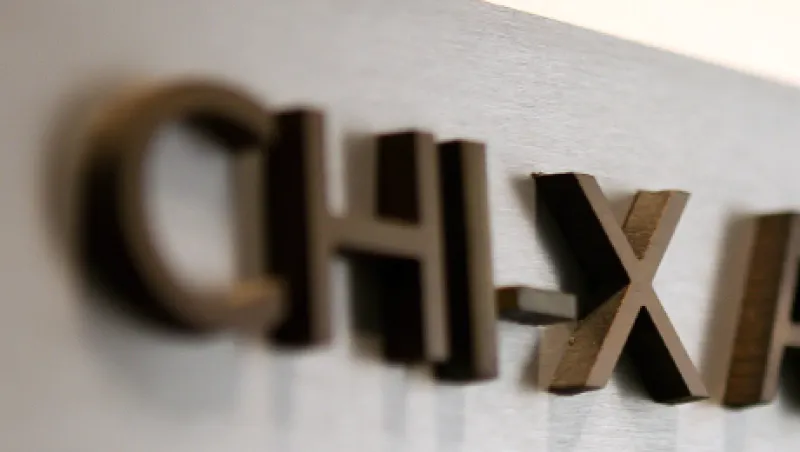With the help of five powerful new investors, New York-based alternative exchange operator Chi-X Global Holdings appears destined to grow — and extend its geographic reach into new markets. On October 18, the firm announced that a handful of financial institutions, including Bank of America Merrill Lynch, Goldman Sachs Group and Morgan Stanley as well as high-frequency trading shops Getco and Quantlab Group had taken equal minority stakes in Chi-X Global totaling an estimated 25 percent. Although the firm’s primary owner, Instinet Inc., a Nomura company, still remains Chi-X Global’s largest shareholder, the exchange-industry upstart has chosen to work more closely with some of its largest clients to help facilitate its strategic expansion.
“The purpose of this financing round was to align our shareholders with our customers more closely as we expand across the globe,” says Tal Cohen, CEO of Chi-X Global. “We want to be able to leverage our investors’ expertise and tap into their intellectual capital as we seek to open up new markets.”
In the three years since its founding in February 2008, Chi-X Global has already established alternative trading platforms under the auspices of its subsidiaries Chi-X Canada and Chi-X Japan; it has also launched Chi-East — the first exchange-backed dark pool (also known as a non-displayed trading platform) in the Asia-Pacific region — as a joint venture with the Singapore Exchange. On Monday, October 31, the company’s newest subsidiary, Chi-X Australia, will go live with a soft launch, offering trading in six securities and two ETFs — which, while still limited, represents a singular achievement after two years of preparatory work to overcome various regulatory hurdles in the Australian market. Some 22 broker-dealers have already signed up to use the new platform — and they may be more than ready to welcome Chi-X Australia’s launch after a technical glitch shut down ASX Trade, the Australian Securities Exchange’s primary equity-trading platform, for four long hours on Thursday, October 27.
“If brokers are unhappy with the services that they are receiving from ASX, they will undoubtedly shift their trading,” says London-based market structure analyst Simmy Grewal of Aite Group, an independent financial services research and advisory firm headquartered in Boston. “People have been waiting quite a while now to trade on Chi-X Australia, so I can understand why so many are standing by, ready to start.”
Chi-X Australia is only one element, however, in Chi-X Global’s expanding portfolio of markets. With the backing of Chi-X Global’s new investors, Cohen is keen to branch out into other regions and has recently discussed the likelihood of targeting markets in Asia — including India, South Korea and Thailand — as well as in Latin America. But the company’s reach will be profoundly affected by regulatory conditions in those individual countries. To date, only a few, like Japan, have adopted regulatory frameworks that even allow the introduction of high-speed, low-cost alternative trading platforms, which have already gained huge market share and transformed equity trading in the U.S., the U.K. and Europe. Although Asia has yet to experience significant market fragmentation, Grewal sees a slight softening of political attitudes toward alternative trading venues, particularly in South Korea.
Although wide-ranging regulatory reform may be needed to unleash the forces of competition in the Asia-Pacific region, alternative exchange operators like Chi-X Global can’t afford to sit back and wait for it — they have to take advantage of current opportunities. With the introduction of its new ownership structure, Chi-X Global appears to be modelling its expansion on the blazing success of its older sibling, Chi-X Europe, which — although it is a completely separate company — is now the largest pan-European trading platform by value of equity traded, according to Thomson Reuters Equity Market Share Reporter. Because four of the five financial institutions that just took equity stakes in Chi-X Global (with the exception of Quantlab) are also stakeholders in Chi-X Europe, such close mirroring is perhaps to be expected. In the four years since its founding, Chi-X Europe has periodically offered equity as a reward to its biggest customers in a bid to encourage their trading business, and Cohen plans to implement a similar strategy at Chi-X Global.
“We think the optimal ownership model is consortium-based,” Cohen says, “and we don’t want to limit the list to just these five investors.” Although Chi-X Global hasn’t offered any guidance on when it will offer an equity-sharing incentive program to its customers, “we would be willing to explore opportunities to broaden our ownership in the future,” Cohen adds.
For Chi-X Global to continue on its current growth trajectory, more support from a broader consortium of shareholders may well prove necessary. Growth is costly, and while Chi-X Canada is profitable, the company as a whole is not. Chi-X Global is currently more focused on gaining a foothold in new markets and providing innovative, low-cost trading alternatives for major banks and broker-dealers than turning a profit at the expense of its current owners and users. “It is hard enough to be global, and it is hard enough to be a start-up — being both poses some interesting challenges,” Cohen says.
With the commitment of new capital from some of Chi-X Global’s key customers, however, the global start-up probably has a long way to run. Chi-X Europe grew very quickly due, in part, to the degree of regulatory harmonization introduced across the European Union by the Markets in Financial Instruments Directive (MiFid) in November 2007. No such harmonization yet exists in Asia, making the prospect of Chi-X Global’s growth much slower and more cost-intensive as the company expands from one regulatory jurisdiction to the next. But the opportunity is there. “I do think it will be a slower journey for Chi-X Global than it was for Chi-X Europe,” says Aite’s Grewal, “but it is also a bigger opportunity. It is just going to take time.”






